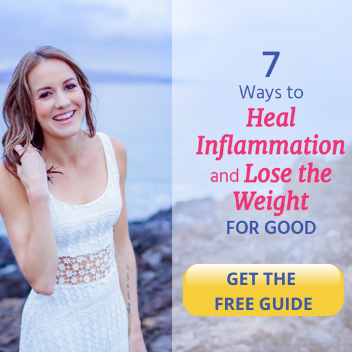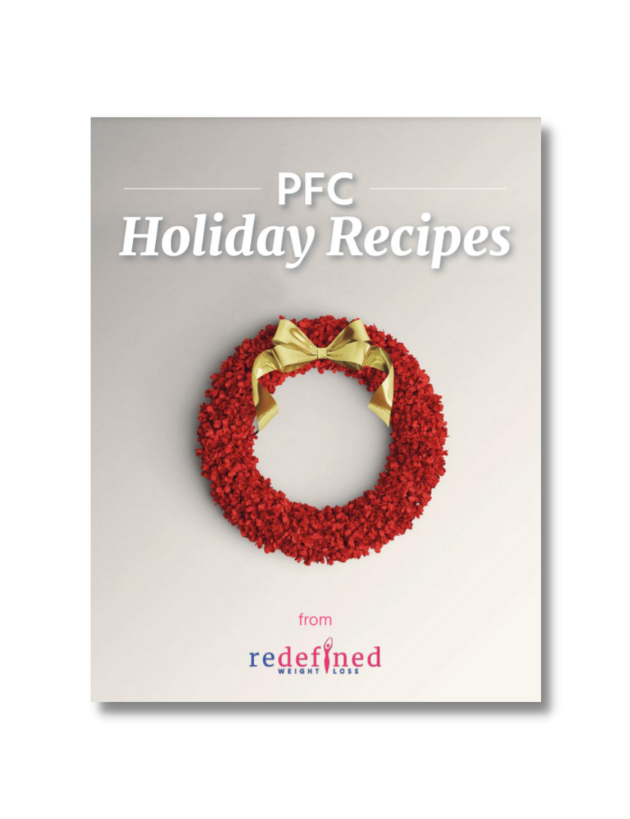Let’s talk about your heart.
Since February is American Heart Month, it’s extra heavy on my heart just how many people I hear from who want to break up with cholesterol. When really…. we should be falling in love with cholesterol over and over again!
First things first—let’s get clear on how serious an issue heart health is, before I explain just why you’ll want to rethink your break up.
Heart Disease is the #1 cause of death in the United States. (And, it drives me crazy that “heart health” still remains one of the most confusing topics in the realm of nutrition!)
I’ve also had a couple of personal scares thanks to all of the misinformation out there.
When I was 20 years old, I was prescribed a statin drug. I was confused and frightened, but ultimately, I decided not to take it. (Which ended up being really smart, for reasons I’ll share in this post.)
Then, the topic of heart health hit home even harder when I received a call that my father needed to have immediate, unexpected major heart surgery. And when I say it was unexpected, I mean it was totally out of left field. My father was the picture of health (or so we thought), having always eaten “right” and exercised a lot. He was even a runner!
I remember sitting in the hospital room with my father, after the surgery, when the dietitian came in and she gave him the same old spiel: “Try to maintain a low-fat, low-calorie diet. Never look at a stick of butter again. You should only eat margarine. Eat oatmeal. Don’t drink. Don’t smoke.”
I told her, “He was already doing all of that.”
And all she could say was, “Okay, well, keep doing it.”
That’s when I got angry. I remember sitting there, thinking, “But this is what landed him on your operating table in the first place!“
During this period, I was studying to become a dietitian, being taught in school that low-fat, low-calorie diets—including plenty of grains and no trace of added fats—were the gold standard for heart health (exactly what my father and I had been practicing!).
But that was the day I realized something was VERY wrong with the information we’d been following.
So I started doing my own research and investigations.
What I learned floored me…
Pretty much everything we’ve been taught about heart health and cholesterol—and nutrition in general—is flat-out WRONG.
(Thanks, outdated textbooks. Thanks, food pyramid. Thanks, research studies sponsored by companies who hope to sway the outcome in their favor. You’ve really caused a lot of confusion. Your advice has backfired and people are SICKER because of it.)
For years, doctors and dietitians have prescribed a low fat, low cholesterol diet for heart health. Coincidentally (or not), the prevalence of type two diabetes, obesity, cancer and yes, heart disease have skyrocketed!
The good news is the science is finally being publicized that debunks all the old myths. (For example, we now know that saturated fat and dietary cholesterol are not linked to heart disease!).
The fact of the matter is that cholesterol does NOT cause heart disease!
Our bodies need cholesterol to heal inflammation and repair damage done to blood vessels and cell walls. Cholesterol is a good guy! The key to heart health is to keep internal inflammation at bay by limiting consumption of sugar, grains, processed carbohydrates and refined oils and healing inflammation by eating MORE healthy fats, exercising smart, managing stress and including quality, heart protective supplements.
To this day, I remain confident in my decision to never take that statin drug, and to eat egg yolks, shrimp, and steak to my heart’s content…and for my heart’s health. My dad is doing the same, and thanks to this, he’s the healthiest he’s ever been, cholesterol be damned.
You might still be balking at the thought of adding saturated fats like butter and cholesterol-filled egg yolks to your diet to protect your heart, and you’re not alone in feeling this way.
So let’s dive into the actual science around cholesterol—what it REALLY is (and what it isn’t), the cholesterol myths that might be harming you rather than helping, and what to do instead.
NEWSFLASH:
Cholesterol does NOT clog your arteries.
Neither does fat.
And neither one leads to heart disease.
Say whaaat?
Yep. Did you know that over half of all heart attacks occur in people with “normal” cholesterol levels? (Less than half of them have high cholesterol!¹)
So what’s the deal? Why do we all (including doctors and even other dietitians) spend so much time worrying about cholesterol and fat in our diets?
It’s because we’ve been told that it “clogs your arteries.” That when you eat a lot of wax-like cholesterol and flubbery fat, both substances stick to the walls of your arteries and vessels, clogging ‘em up and leading to heart disease.
At face value, that explanation seems to make sense. The imagery is just so vivid. But the truth is — your internal body temperature wouldn’t even allow cholesterol to stick to your vessel walls because it would melt!
Unfortunately, because those images are so powerful, it’s hard to overcome this false belief that cholesterol and fat cause heart disease.
So what IS cholesterol, if it’s not what we believed all these years?
Cholesterol is actually a fat-like substance found in every cell in your body. Without it, you would die.
Let me say that again—without cholesterol, you would die. It’s necessary for hormone production, for fixing microscopic tears in blood vessels, for repairing damaged nerves, for facilitating fat digestion, and more! You need it to survive. So, yay cholesterol!
Cholesterol is so incredibly essential that if your body doesn’t get enough of it from the food you’re eating, it will naturally produce it. (Alternately, eating enough of it supports your body by giving it a break from having to make as much—it’s a taxing process.)
The real problem (and what actually promotes heart disease) is inflammation.
Cholesterol acts as a protective mechanism, healing the damage caused by the inflammation. So cholesterol is the hero, not the villain.
Imagine there’s a fire and when the crew of firefighters come to put it out, we blamed them for causing the fire. That would be ridiculous, but that’s exactly what’s happening when we blame cholesterol for causing heart disease. Cholesterol simply comes to the rescue to heal your body of existing inflammation. Cholesterol is a good guy!
Let’s not misplace the blame.
When cholesterol levels increase, it can mean that your body is trying to fight internal inflammation. So simply eating less cholesterol or reducing cholesterol numbers doesn’t reduce the risk of death from heart disease.
The question we should be asking is: “How did the fire start? What caused the inflammation?”
Research suggests that heart disease is a result of too much sugar and processed carbohydrates ²,³—not too much saturated fat.⁴ (This means that bread and pasta may be at fault for promoting heart disease, not the cholesterol in your egg yolks and steak.)
Think of carbs and sugar as little pieces of glass that are cutting up your vessels and causing inflammation. When this happens, your body needs cholesterol to heal those tiny lesions in the blood vessels.
Okay, so how can you help the cholesterol to heal the inflammation?
First, just let me say—if a doctor tells you that your cholesterol is high and tries to prescribe you a statin drug, RUN AWAY.
Statin drugs are one of the bestselling drugs in the United States and are given out like candy as a quick fix to lower cholesterol. And they’re pretty much a scam.
Now that you know that forcing your cholesterol to lower doesn’t decrease your chances of heart disease (remember, the cholesterol is helping), you can see why statin drugs have never been shown to be effective in people who don’t currently have heart disease. (The ONLY group that has been shown to benefit from a statin drug are middle aged men who already have heart disease.)
Any help they DO give isn’t because they lower cholesterol but because they are anti-inflammatory. But, you can reduce inflammation with food, key supplements and lifestyle changes—all of which don’t include the terrible side effects of statin drugs, including muscle pain, fatigue, weakness, memory and cognition problems and depleting the body of CoQ10, one of the most important nutrients for the heart.
(I told you there was a reason I’m so glad I decided not to take the statin drugs that were prescribed to me when I was 20 years young.)
Okay, now that you know what NOT to do, here are 3 things you CAN do:
1. Eat less sugar and fewer processed carbohydrates: To review, at the root of heart disease is inflammation, which is caused by sugar and refined carbohydrates which make little lesions in your vessels.
2. Shift your diet to an ACTUAL “heart healthy” diet: These are the basics: embrace healthy fats, proteins, and carbohydrates from sources like vegetables and fruit.
3. Use supplements to support your heart: I get asked about supplements ALL the time, and my answer is always, “Supplements can be great and very helpful…but only if you use high-quality, effective supplements that don’t include questionable ingredients.“
Unfortunately, most supplements don’t fit that bill (and many are downright scary.) Fortunately, I got so frustrated with all the mediocre supplements out there that I created my own line, Redefined Vitamins and the Gut Health Kit has 3 of the main heart health supplements bundled together for 10% off.
Here’s a quick rundown of the supplements I recommend to promote heart health:
- Fish Oil Redefined. Fish oil provides omega 3 fatty acids, which are essential for heart health—as well as brain health, weight loss and maintenance, and reducing inflammation, muscle and joint pain.
- Probiotic Redefined. These probiotics are essential for proper digestion and good gut health, both of which support your ability to absorb nutrients that help reduce inflammation (i.e. heart healthy!).https://www.rfvitamins.com/products/gut-health-kit/
- Glutacaps Redefined. L-Glutamine is an amino acid that plays a vital role in digestion, supporting nutrient absorption while reducing inflammation (also heart healthy!).
- CoQ10 Redefined. One of the most important nutrients for the heart—also essential for the health of virtually all human tissues and organs. CoQ10 works to combat free radical damage and helps the heart work more efficiently.
*Special Savings: Get 10% off the first 3 of these by getting them bundled together here!
Okay! Thanks for sticking with me—I know this was a long post, but as you can tell, I’ve got a lot to say on this subject. 🙂
Skipped to the end for the Cliffs Notes version?
Here ya go—cholesterol does not cause heart disease. When you have high cholesterol, it’s because the cholesterol is actually trying to heal inflammation. Inflammation is what causes heart disease. So, instead of taking drugs to lower your cholesterol, you want to focus on lowering your inflammation. You’ll also want to check out our heart-healthy supplements (you can get 10% off Fish Oil Redefined, Probiotic Redefined and Glutacaps Redefined bundled together here.)
-
Sachdeva, Amit et al. “Lipid Levels In Patients Hospitalized With Coronary Artery Disease: An Analysis Of 136,905 Hospitalizations In Get With The Guidelines”. Ahjonline.com. N.p., 2016.
-
Johnson, R. K. et al. “Dietary Sugars Intake And Cardiovascular Health: A Scientific Statement From The American Heart Association”. Circulation 120.11 (2009): 1011-1020.
-
Jakobsen MU, et al. “Intake Of Carbohydrates Compared With Intake Of Saturated Fatty Acids And Risk Of Myocardial Infarction: Importance Of The Glycemic Index. – Pubmed – NCBI”. Ncbi.nlm.nih.gov. N.p., 2016.
-
Siri-Tarino, P. W et al. “Meta-Analysis Of Prospective Cohort Studies Evaluating The Association Of Saturated Fat With Cardiovascular Disease”. American Journal of Clinical Nutrition 91.3 (2010): 535-546.











